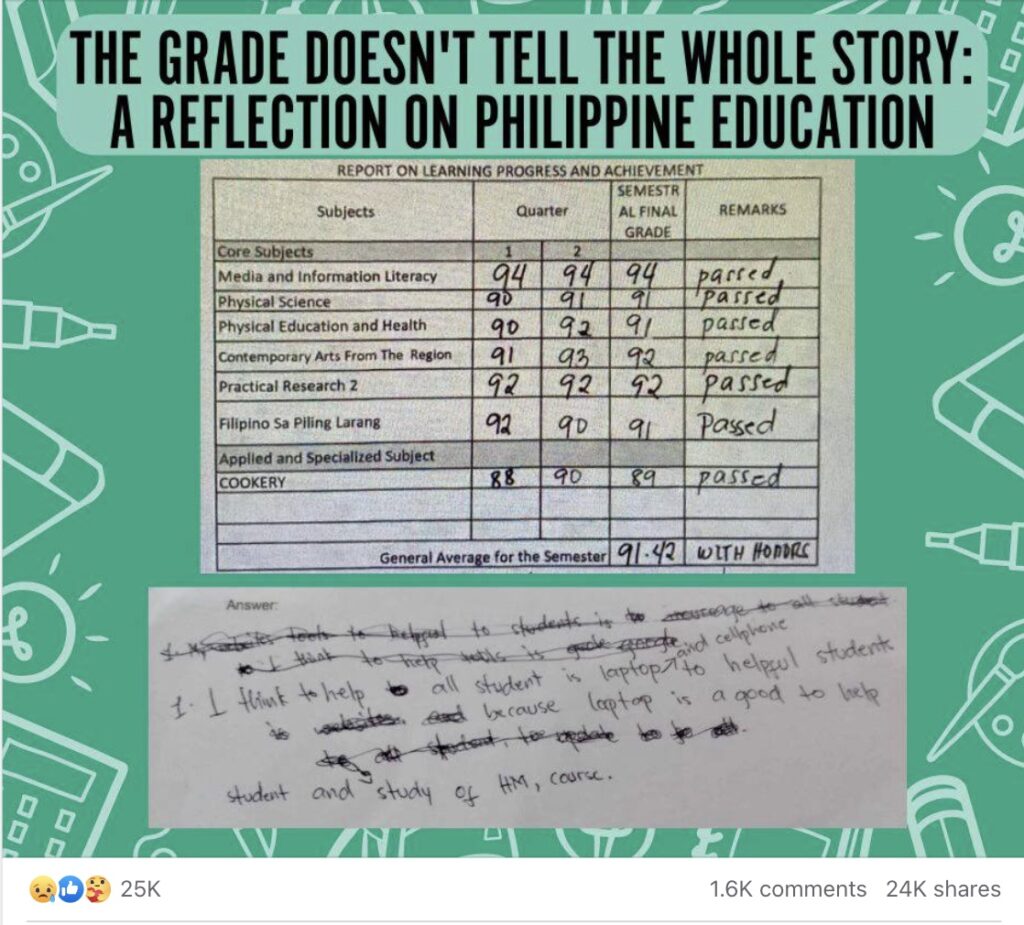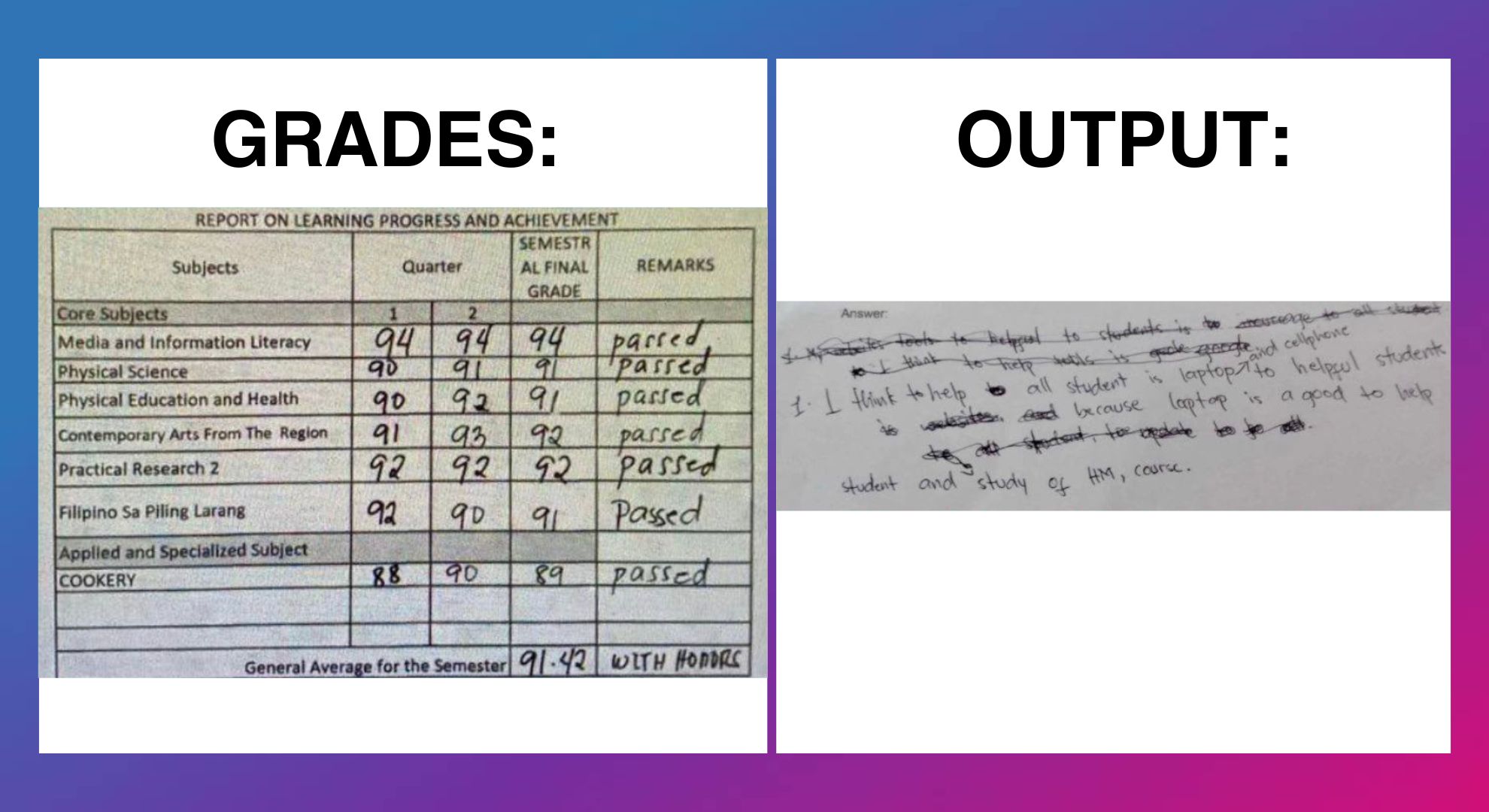A viral post from a Facebook user has sparked a significant conversation about the true state of education in the Philippines. The post, shared widely across social media, highlights a troubling disconnect between reported academic performance and actual competencies among students.
OP’s commentary centers on the case of an applicant to a Bachelor of Science in Hospitality Management (BSHM) course who, despite having stellar grades ranging from 90 to 94, exhibited severe deficiencies in basic English language skills and comprehension. This incident has not only brought attention to individual shortcomings but has also underscored systemic issues within the educational framework.

The post reads:
“Here is the report card of an applicant to our BSHM course and one of that student’s answer to an essay question. The student has stellar grades on the report card, but struggles to string together a simple sentence in English, reads at a snail’s pace, and misinterprets even the simplest instructions. After getting an email of non-acceptance, the mother called the registrar to complain why her ‘intelligent’ child was not accepted. We have seen so much ‘drama’ in our registrar’s office this month, with tears flowing. But No, we are standing by our ground. We are a private school after all. Students and parents should realize that grades are not everything, real education is so much more. 📚 This isn’t just an isolated case. Many of them are like this. It’s a symptom of a larger issue in our educational system. This post is not about blaming teachers or students. It’s about hoping to wake everyone to the crisis in our educational system. I think this issue is more important than the price of rice. #EducationReformNow”
The essay excerpt provided in the post further illustrates the issue: “I think to help all student is laptop and cellphone to helpful students because laptop is a good to help student and study of HM, course.” This sentence, riddled with grammatical errors and lacking coherence, stands in stark contrast to the student’s impressive grades, raising questions about the metrics used to evaluate academic performance in schools.
The post sheds light on the current nature of academic excellence that is pervasive in the current educational system. It emphasizes the critical need for a reevaluation of the parameters used to gauge student success. The reliance on numerical grades as the primary measure of academic achievement has led to a dangerous trend where the true objective of education—holistic understanding and critical thinking—is often sidelined. The discrepancy between the applicant’s grades and their actual skills is a symptom of a larger problem: the overemphasis on rote learning and the underdevelopment of essential skills such as critical thinking, problem-solving, and effective communication.
This situation underscores a systemic failure, where grades are being inflated or students are being pushed through the system without ensuring they have grasped the necessary competencies. The student’s inability to articulate a coherent thought despite high grades reveals a fundamental flaw in teaching methodologies and assessment practices. The post’s mention of frequent similar incidents indicates a pervasive issue that demands immediate attention and action.
The reaction of the parent, who believed that high grades equated to qualification, further reflects a widespread misconception about what true education entails. This belief is not uncommon and speaks to a societal issue where the value of education is often reduced to numerical achievements rather than actual knowledge and skills. OP’s stand on maintaining the integrity of their institution’s admission standards, despite parental pressure, is commendable and highlights the need for educational institutions to prioritize genuine learning over superficial success.
Implementing this kind of system evidenlty resulted to a noticeable increase in the number of honor students in our country. In the past, it was challenging to see your name on the honor list due to demanding requirements. Today, however, we are seeing a ‘more inclusive approach’ to recognizing academic achievement. But does this approach maintain our students’ competency?
In this crisis, a multifaceted approach is required. There must be a shift in assessment practices to ensure that grades accurately reflect a student’s understanding and capabilities. Standardized testing, project-based assessments, and oral examinations could provide a more comprehensive evaluation of a student’s abilities. Secondly, there needs to be an overhaul in teaching methodologies to focus on developing critical thinking, creativity, and effective communication skills. Educators should be trained to move away from rote memorization techniques and instead foster an environment that encourages questioning, exploration, and application of knowledge.
Furthermore, there is an urgent need for policy reform at the national level to address these systemic issues. The government, educational institutions, and stakeholders must collaborate to develop and implement policies that prioritize quality education over quantitative metrics. Investments in teacher training, curriculum development, and educational resources are crucial to ensuring that students receive a holistic and meaningful education.
The viral post has ignited an essential dialogue about the state of education in the Philippines. The incident serves as a wake-up call to the systemic flaws that prioritize grades over actual learning and underscores the urgent need for comprehensive educational reform. It is imperative that stakeholders at all levels recognize the gravity of this issue and work collectively to ensure that education in the Philippines is truly reflective of student understanding and capability, thereby fostering a generation of competent and critical thinkers.
Other POP! stories you might like:
Filipino educator’s call for presidential support on his ‘math discovery’ met with backlash
A statement from Cinemalaya entry ‘Balota’ reflects public’s sentiments amid Super Typhoon Carina
Filipino influencer faces backlash for seemingly describing swimming in flood as a ‘fun’ experience
‘Controversial’ Virgin Mary sculpture vandalized in Austria, artists and catholics react


![[Commentary] Do academic grades still reflect true competency in today’s education system?](https://pop.inquirer.net/files/2024/07/MHJ-150x150.jpg)
![[Commentary] Do academic grades still reflect true competency in today’s education system?](https://pop.inquirer.net/files/2024/07/Fairly-odd-parents-1-150x150.jpg)